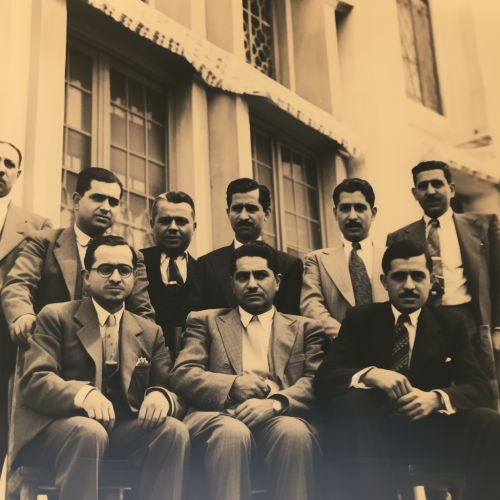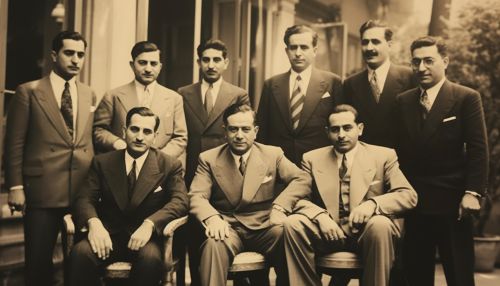Ba'ath Party
Origins and Ideology
The Ba'ath Party, officially the Arab Ba'ath Socialist Party, is a political party founded in Syria by Michel Aflaq and Salah al-Din al-Bitar. The party espouses Ba'athism, a mix of Arab nationalism, socialism, and Pan-Arabism. The party's ideology is officially summarized as a belief in the Arab Nation, Arab Socialism, and Freedom, which are interrelated and complementary. The party's ideology is based on the thought and principles of Zaki al-Arsuzi, considered the principal founder of Ba'athist thought.
History
The Ba'ath Party has a complex history that spans several decades and involves numerous political shifts and changes in leadership. The party was initially established in Syria in 1947 and later expanded to other Arab countries, most notably Iraq. The party's history is often divided into three distinct phases: the founding and early years (1947-1966), the regionalist era (1966-2000), and the reformation era (2000-present).
Founding and Early Years (1947-1966)


The Ba'ath Party was founded in 1947 by Michel Aflaq and Salah al-Din al-Bitar, two Syrian intellectuals who were deeply influenced by the nationalist and socialist ideologies of the time. The party's early years were marked by ideological development and political struggle, as it sought to establish itself in the turbulent political landscape of post-independence Syria.
Regionalist Era (1966-2000)
The regionalist era of the Ba'ath Party began in 1966 with the coup d'état in Syria that brought a regionalist, military faction of the party to power. This era was marked by the rise of the Ba'ath Party in Iraq, which culminated in the seizure of power by the party's Iraqi Regional Branch in 1968. The regionalist era was characterized by the dominance of the party's regional branches in Syria and Iraq, which often pursued divergent policies and were frequently at odds with each other.
Reformation Era (2000-present)
The reformation era of the Ba'ath Party began in 2000 with the death of Syrian President Hafez al-Assad and the subsequent ascension of his son, Bashar al-Assad, to the presidency. This era has been marked by attempts at political and economic reform, as well as a brutal civil war in Syria that has severely tested the party's hold on power.
Structure and Organization
The Ba'ath Party is organized on a hierarchical basis, with the National Command at the top, followed by the Regional Commands, the Branch Commands, the Section Commands, and finally the Basic Organizations at the local level. The party's structure is designed to ensure the centralization of decision-making and the strict discipline of its members.
Influence and Impact
The Ba'ath Party has had a profound impact on the political, social, and economic life of the Arab world. Its influence has been felt in a variety of areas, from the shaping of national identities and the promotion of Arab unity, to the implementation of socialist economic policies and the suppression of political dissent.
Criticism and Controversy
The Ba'ath Party has been the subject of considerable criticism and controversy throughout its history. Critics have accused the party of authoritarianism, corruption, and human rights abuses, particularly during its rule in Iraq under Saddam Hussein.
